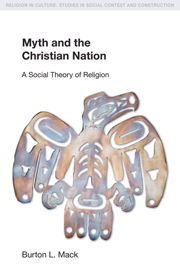Book contents
- Frontmatter
- Contents
- Dedication
- Preface
- Introduction
- Part I The Religions of Other Peoples
- Part II The Religion of Christianity
- Chapter 5 Early Christian Mythmaking
- Chapter 6 The Social Formation of Christendom
- Chapter 7 The State of the Christian Nation
- Chapter 8 Religions in a Polycultural World
- Conclusion
- Bibliography
- Index
Chapter 5 - Early Christian Mythmaking
from Part II - The Religion of Christianity
- Frontmatter
- Contents
- Dedication
- Preface
- Introduction
- Part I The Religions of Other Peoples
- Part II The Religion of Christianity
- Chapter 5 Early Christian Mythmaking
- Chapter 6 The Social Formation of Christendom
- Chapter 7 The State of the Christian Nation
- Chapter 8 Religions in a Polycultural World
- Conclusion
- Bibliography
- Index
Summary
We now want to consider Christianity as a religion. The reader will have noticed that occasional references have been made to Christianity as the unacknowledged source for the concept of religion in the Euro-American study of religions. A familiarity with Christianity has been taken for granted as the definition of religion in the scholarly study of religions, giving rise to an unexamined concept that has repeatedly run into problems when applied to the religions of other peoples. I have therefore developed a set of categories to explain the social interests and intellectual investments at work in the myths and rituals of other peoples. I have emphasized the relation between mythmaking and social interests, whereby the two environments of the social and natural worlds expand the horizons of the imagination to provide a canopy for mythic imagination to position the gods. The gods are personifications of forces beyond the empirical world within which limited control of social formation and production occurs. The point has been made that the social interests are basic, the inexplicable forces are real, the imagined personifications are appropriate acknowledgments of these forces, and the intellectual labors are constructive. The time has come to apply these categories to a redescription of Christianity.
Before we begin, a word needs to be said about the term Christianity used in the singular.
- Type
- Chapter
- Information
- Myth and the Christian NationA Social Theory of Religion, pp. 146 - 182Publisher: Acumen PublishingPrint publication year: 2008



